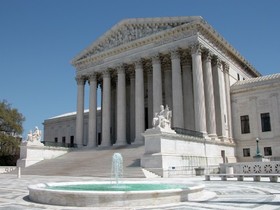The case is Gonzales v. Raich (PDF format), better known as the medical marijuana case. The Supreme Court ruled, 6-3, that the federal government can (in effect) outlaw medical marijuana use despite the fact that some states (ten of them) have made it legal.
What the case is about is federalism and the Commerce Clause of the U.S. Constitution. For a quick (and oversimplified) review, the legal landscape is this:
(1) The Commerce Clause allows Congress to regulate things that are subject to interstate commerce (e.g., the sale of wheat between states, or foreign commerce)
(2) The Commerce Clause allows Congress to regulate instrumentalities of commerce (e.g., trucks, trains, etc. that transport wheat between states)
(3) The Commerce Clause allows Congress to regulate in areas which “substantially affect”“ interstate commerce, including commerce that is entirely conducted within the borders of one (i.e., intrastate commerce)
This case falls in the third category, which I delve into below the fold.
When kind of intrastate activity “substantially affects” interstate commerce? That’s the hard question. Fortunately, we have some guideposts from three previous cases:
(a) Wickard v. Filburn (1942): A guy selling wheat solely within his own state is still subject to federal regulations regarding wheat sales, because his activity (and the activities of those like him) will affect the interstate commerce involving wheat.
(b) U.S. v. Lopez (1995): A federal law banning gun sales within 1000 feet of schools does NOT “substantially affect” interstate commerce (of guns). Therefore, Congress acted outside the scope of the Commerce Clause.
(c) U.S. v. Morrison (2000): A federal law prohbiting violence against women does not fall within the Commerce Clause. Why not? It doesn’t involve commerce, nor does it substantially affect interstate commerce.
The problem for the Supreme Court in this medical marijuana case was where it fell in relation to the cases above. The majority thought that it was closer to Wickard v. Filburn—therefore, Congress could regulate medical marijuana and the federal law “trumps” the states which have laws allowing for medical marijuana.
Here’s why they are wrong: the medical marijuana at issue was not bought or sold. It was grown by the medical marijuana recipient, and smoked. In other words, UNLIKE the farmer in Wickard v. Filburn, there was no “commerce” involved with the marijuana.
Yes, Kman, you cry, but doesn’t homegrown use of medical marijuana “substantially affect” interstate commerce of marijuana?
That depends on where you want to draw the line. To that end, the dissent makes a good analogy. They say, for example, that “charades games act as a substitute for movie tickets”. And while Congress can regulate movies (since the film is physically transported interstate), can we really say that Congress can ban people from playing a game of charades at home on the theory that doing so would have a possible effect on the number of people who go to the movies?
I fail to see, other than pure conjecture and theory, how homegrown medical marijuana use substantially effects the interstate trade of marijuana. And neither did the dissenting justices of the Supreme Court. This case is closer to the U.S. v. Morrison case discussed above.
What’s worse, it seems to me that the phrase “substantially effecting interstate commerce” has been applied so broadly here, that it almost (almost) turns the Commerce Clause into a federal Police Power clause. After this case, ANYTHING—even the most innocent private non-commercial activity—could be viewed as “substantially affecting interstate commerce”.
I’m going to have to side with the libertarians and states righters on this one: I think the dissent (Rehnquist, O’Connor, and Thomas) had the better argument here.

